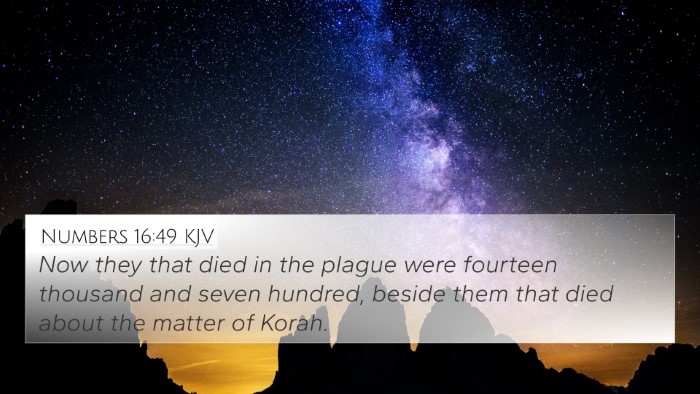Understanding Numbers 11:33
Numbers 11:33 reads: "While the meat was yet between their teeth, ere it was chewed, the wrath of the Lord was kindled against the people, and the Lord smote the people with a very great plague." This verse captures a profound moment in the history of Israel, illustrating the consequences of their ungratefulness and rebellion against God. The richer understanding of this passage combines insights from authoritative public domain commentaries, providing a deeper look at its meaning and theological implications.
Summary of Insights
According to Matthew Henry, this verse highlights the impatience and ingratitude of the Israelites, who preferred fleshly desires over God's provision of manna. Their craving for meat represented a rejection of God's sustenance that was intended for their spiritual growth. The quick ensuing judgment signifies the seriousness of their transgression against God's commands.
Albert Barnes remarks on the intensity of God's response. The choice of words, "while the meat was yet between their teeth," suggests that the punishment was swift and catastrophic, reflecting the immediacy of God's judgment when His people indulge in discontentment. The "very great plague" is seen as a drastic measure indicating that God will not tolerate rebellion and entitlement.
In the view of Adam Clarke, the text serves as a warning to the faithful about the dangers of longing for what is forbidden or what leads away from God's purpose. Clarke stresses that the passage conveys the sovereignty of God over His people, reminding us that His grace should not be taken for granted.
Thematic Connections
This verse can be linked to several key biblical themes:
- Discontentment and Grumbling: The Israelites’ cries for meat reflect a common human tendency to grumble against God's provision.
- God's Sovereignty: His immediate judgment demonstrates ultimate authority over His creations and the seriousness with which He takes their sins.
- The Consequences of Rebellion: This account serves as a warning that rebellion against God can lead to severe consequences.
- Provision: The contrast between the meat they craved and the heavenly manna emphasizes spiritual nourishment over physical desires.
Cross-References for Enhanced Understanding
Several verses throughout the Bible resonate with the themes of Numbers 11:33, showcasing the interconnectedness of scripture:
- Psalm 78:30-31: "They were not estranged from their lust." This reflects God's anger towards Israel's cravings.
- Exodus 16:3: The Israelites express their desire for the meat of Egypt, illustrating a recurring pattern of discontent.
- 1 Corinthians 10:10: "Neither murmur ye, as some of them also murmured, and were destroyed of the destroyer." A clear warning about the danger of discontent.
- Hebrews 12:29: "For our God is a consuming fire." A reminder of God's holiness and His just nature in dealing with sin.
- Proverbs 1:24-26: "I have called, and ye refused." This relates to the rejection of God's warnings.
- Philippians 2:14: "Do all things without murmurings and disputings," echoing the attitude God desires from His people.
- James 1:14-15: Discusses the progression from desire to sin, illustrating the danger of unchecked cravings.
Applications and Lessons
As modern readers, it is essential to consider the lessons from Numbers 11:33 in our lives:
- Gratitude: Reflect on what God has provided rather than what we perceive as lacking.
- Awareness of Consequences: Understand that choices have consequences that can impact our spiritual journey.
- Spiritual Nourishment: Focus on what truly feeds our spirit rather than succumbing to worldly desires.
Conclusion
This examination of Numbers 11:33 reveals the multifaceted nature of scripture and demonstrates the importance of cross-referencing biblical texts. The interconnectedness exemplified in this verse encourages deeper engagement with the Bible, fostering a better understanding of God's character, the human condition, and the call to authentic discipleship.
Further Study Resources
For those seeking to enhance their study of scripture, consider utilizing:
- Bible Concordance: A crucial tool for finding verses and themes throughout the Bible.
- Bible Cross-Reference Guide: A system designed to help you make connections between various parts of the text.
- Cross-Referencing Bible Study Methods: Techniques that facilitate a holistic understanding of scripture.







